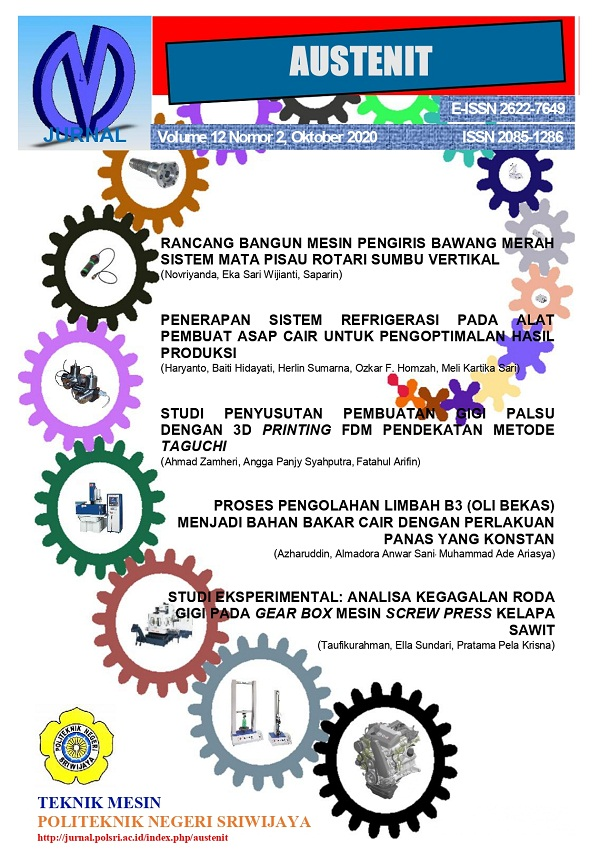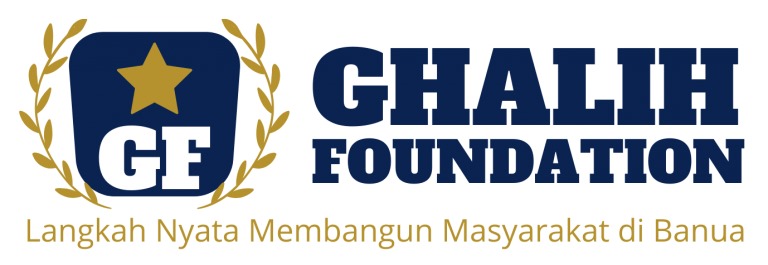STUDI PENYUSUTAN PEMBUATAN GIGI PALSU DENGAN 3D PRINTING FDM PENDEKATAN METODE TAGUCHI
Abstract
Fused Deposition Modeling (FDM) is a 3D Printing technique used to print products using filaments as material. The printed product has ideal geometric characteristics if it has meticulous size and perfect shape. The main objective of this research is to find out the shrinkage of the material is the filament human denture product using prameter is different. In the process of testing this test using the tool testers Digimatic Vernier Caliper Mitutoyo Absolute, which uses accuracy 0,02 mm. The Taguchi method are used to analyzed the data result. Manufacture process which is used Layer Height 0,15 mm, Print Speed 20 mm/s, dan Print Temperature 220 â°C.
Keywords: FDM 3D Printing, Shrinkage, Taguchi
Â
Downloads
References
Jenarthanan, M. P., & Jeyapaul, R. (2018). Optimisation of machining parameters on milling of GFRP composites by desirability function analysis using Taguchi method. International Journal of Engineering, Science and Technology. https://doi.org/10.4314/ijest.v5i4.3
Liao, H. C. (2003). Using PCR-TOPSIS to optimise Taguchi’s multi-response problem. International Journal of Advanced Manufacturing Technology. https://doi.org/10.1007/s00170-002-1485-x
Putra, K. S., Ds, S., Sari, U. R., & Ds, S. (2018). Pemanfaatan Teknologi 3D Printing Dalam Proses Desain Produk Gaya Hidup. Pemanfaatan Teknologi 3D Printing Dalam Proses Desain Produk Gaya Hidup.
Rahman, F., Saputera D. dan Adhani R. (2016). Faktor yang Mempengaruhi Permintaan Gigi Tiruan pada Lansia (Tinjauan Terhadap Biaya Perawatan, Kecemasan dan Sarana). Jurnal Kedoktera Gigi Unej, 13(1), 5–11
Rengier, F., Mehndiratta, A., Von Tengg-Kobligk, H., Zechmann, C. M., Unterhinninghofen, R., Kauczor, H. U., & Giesel, F. L. (2010). 3D printing based on imaging data: Review of medical applications. In International Journal of Computer Assisted Radiology and Surgery. https://doi.org/10.1007/s11548-010-0476-x
Satyanarayana, B., & Prakash, K. J. (2015). Component Replication Using 3D Printing Technology. Procedia Materials Science. https://doi.org/10.1016/j.mspro.2015.06.049
Sidi, P., & Wahyudi, M. (2013). Aplikasi Metoda Taguchi Untuk Mengetahui Optimasi Kebulatan Pada Proses Bubut Cnc. Rekayasa Mesin.
Yaman, U. (2018). Shrinkage compensation of holes via shrinkage of interior structure in FDM process. International Journal of Advanced Manufacturing Technology. https://doi.org/10.1007/s00170-017-1018-2
Downloads
Published
How to Cite
Issue
Section
License
The Authors submitting a manuscript do so on the understanding that if accepted for publication, Authors retain copyright and grant the AUSTENIT right of first publication with the work simultaneously licensed under a Creative Commons Attribution-ShareAlike License that allows others to share the work with an acknowledgment of the work's authorship and initial publication in this journal.
AUSTENIT, the Editors and the Advisory International Editorial Board make every effort to ensure that no wrong or misleading data, opinions or statements be published in the journal. In any way, the contents of the articles and advertisements published in AUSTENIT are the sole responsibility of their respective authors and advertisers.















